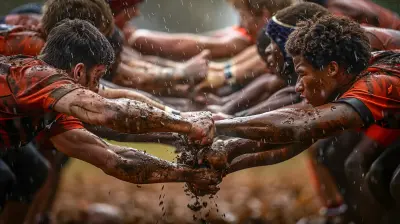How to Balance Individual Talents with Team Goals
10 March 2025
In team sports, the tension between individual talent and team goals is as old as the games themselves. Whether you’re playing soccer, basketball, or any other team-based sport, this balancing act is a common challenge. Why? Because every player wants to shine, right? But at the same time, the ultimate goal is for the team to win. It’s a tricky tightrope to walk, but it’s absolutely essential for success.
So, how do you make sure that individual brilliance doesn’t overshadow the collective goal? How can a team harness the unique skills of each player without losing sight of the bigger picture? Let’s dive into the strategies and mindset shifts that can help athletes and coaches strike the perfect balance between individual talents and team goals.

Recognize the Importance of Both
First off, let’s get one thing straight: individual talent matters. Whether it's the ability to score from anywhere on the field or having impeccable ball-handling skills, individual strengths can turn the tide in a game. But it’s equally important to acknowledge that no individual, no matter how talented, can win a game alone. Even the most skilled player needs support from teammates to consistently succeed.Think about it like this: A sports team is like an orchestra. Sure, the violinist might be brilliant, but if the rest of the orchestra isn’t in sync, the music will sound off. Likewise, in team sports, the real magic happens when everyone works together.
Key Takeaway:
- Individual talent is important, but it has to be woven into the fabric of the team’s goals for true success.
Cultivate a Team-First Mentality
One of the most effective ways to balance individual talent with team goals is to foster a team-first mentality. This doesn’t mean suppressing individual contributions, but rather aligning personal ambitions with the broader objectives of the team. A player should always ask, "How can my skills contribute to the success of the team?"Coaches play a pivotal role here. They need to instill a clear sense of purpose and unity, emphasizing that the team’s success is the priority. When everyone knows that the collective goal is more important than individual glory, it becomes easier for players to subdue their ego and focus on what truly matters: winning together.
Key Takeaway:
- A team-first mentality should be the foundation of every strategy, ensuring that individual efforts contribute to the overall team success.
Define Roles Clearly
Every player on a team has a role, and understanding that role is crucial for balancing individual abilities with team goals. Not every player is going to be the star scorer, and that’s okay. Some players excel at defense, others at playmaking, and some might be particularly good leaders on the field.When roles are clearly defined, it allows each player to focus on maximizing their strengths within the context of the team's needs. Imagine if a soccer goalie suddenly decided they wanted to play as a forward because they wanted to score goals. It wouldn’t make sense, right? The goalie’s unique talents are best used in their designated position.
By clearly defining roles, everyone knows their part in the greater scheme of things, making it easier for individual talents to complement each other rather than compete.
Key Takeaway:
- Clearly defined roles help individual talents work in harmony, preventing unnecessary overlap or competition within the team.
Communication is Key
You can have all the talent in the world, but if the communication on the field or court isn’t there, it’s all for nothing. Clear, honest, and open communication is the linchpin of any successful team. It’s what keeps everyone on the same page and ensures that individual talents don’t derail the team’s overall strategy.For example, if a basketball player is known for their three-point shooting, but they’re not communicating with their teammates about when and where they want the ball, the opportunity to capitalize on their talent is wasted. Similarly, if a player is struggling in a game, they need to feel comfortable speaking up so the team can adjust accordingly.
Communication isn’t just about shouting instructions during a game. It’s also about having honest conversations off the field—discussing strategies, tactics, and even personal concerns. When everyone is communicating effectively, it becomes much easier to integrate individual skills into the team framework.
Key Takeaway:
- Open communication ensures that individual talents are used effectively and that everyone is aligned with the team’s goals.Build Trust Among Teammates
One of the greatest barriers to balancing individual talent with team goals is a lack of trust. If players don’t trust each other, they may feel the need to “do it all” on their own, which can lead to selfish play and ultimately harm the team.Trust is built over time through shared experiences, practice, and, yes, even through failure. When players trust their teammates, they’re more willing to pass the ball, share the spotlight, and make sacrifices for the greater good. This trust allows individual talents to shine without disrupting the team dynamic.
Example: Think of any great sports team—whether it’s the Golden State Warriors in basketball or the Spain national soccer team during their World Cup-winning years. These teams weren’t just talented; they trusted each other. They knew that if they made a pass, their teammate would be in the right place to receive it. This kind of trust is what enables individual talents to blend seamlessly with team goals.
Key Takeaway:
- Trust is the glue that holds a team together, enabling individual talents to complement each other rather than clash.
Encourage Healthy Competition
Let’s face it: competition within a team isn’t necessarily a bad thing. In fact, healthy competition can push individuals to perform at their best. But the key word here is healthy. The competition should never become toxic or self-serving. Instead, it should inspire players to improve while still keeping the team’s goals in mind.A great way to foster healthy competition is to set individual and team-based benchmarks. For example, a basketball coach might challenge each player to improve their free throw percentage, but also emphasize that the ultimate goal is to win more games as a team. This way, individual players are motivated to improve, but their improvements are directly tied to the team’s success.
Key Takeaway:
- Encourage competition, but ensure it’s framed within the context of improving the team as a whole.Empower Leaders on the Team
Every team needs leaders—players who can set the tone both on and off the field. These leaders play a crucial role in balancing individual talent with team goals. They’re the ones who can step in when things get off track, reminding everyone of the bigger picture.Leaders don’t always have to be the most talented players on the team. In fact, sometimes the most effective leaders are those who understand the importance of teamwork over individual achievement. They can encourage others to play unselfishly, maintain discipline, and keep morale high when things get tough.
Coaches should identify these leaders and empower them to take charge. Whether it’s through giving pep talks, leading by example, or pulling a teammate aside for a one-on-one chat, these leaders are essential for maintaining balance within the team.
Key Takeaway:
- Strong leadership helps keep individual talents aligned with the team’s goals, ensuring everyone is working toward the same objective.
Focus on the Bigger Picture
Finally, it’s essential that both players and coaches keep the bigger picture in mind. In the heat of the moment, it can be easy to get caught up in personal stats or individual accolades. But at the end of the day, sports are team-oriented for a reason. The ultimate goal is to win together, not to outshine your teammates.One way to keep the focus on the bigger picture is to celebrate team achievements more than individual ones. Sure, it’s great if a player scores a hat trick or sinks a game-winning three-pointer. But when the team wins, everyone should share in that success. By consistently emphasizing the team’s accomplishments, you reinforce the idea that individual success only truly matters when it contributes to the team’s goals.
Key Takeaway:
- Always prioritize the team’s success over individual achievements to maintain long-term cohesion and success.Conclusion
Balancing individual talents with team goals is no easy task, but it’s absolutely essential for long-term success in any team sport. By fostering a team-first mentality, clearly defining roles, emphasizing communication, building trust, encouraging healthy competition, empowering leaders, and focusing on the bigger picture, you can create a team dynamic where individual brilliance enhances, rather than detracts from, collective success.At the end of the day, the best teams aren’t the ones with the most talent on paper—they’re the ones who know how to make all those talents work together toward a shared goal.
all images in this post were generated using AI tools
Category:
Team SportsAuthor:

Preston Wilkins
Discussion
rate this article
19 comments
Piper McTavish
Great article! It’s so true that finding the sweet spot between showcasing individual talents and achieving team goals can be tricky. I love how you highlighted the importance of communication and collaboration. When everyone supports each other, it not only enhances performance but also makes the game more enjoyable. Keep up the great writing!
April 3, 2025 at 10:18 AM

Preston Wilkins
Thank you for your kind words! I’m glad you found the points on communication and collaboration valuable. It really is all about supporting each other for greater success!
Lisette Taylor
Intriguing topic! How can we harmonize individual brilliance with teamwork?
April 1, 2025 at 4:02 AM

Preston Wilkins
Thank you! Harmonizing individual brilliance with teamwork requires clear communication, mutual respect, and goals that allow personal strengths to shine while contributing to shared objectives.
Courtney McCullough
Great article! Balancing individual talents with team goals can be challenging, yet it's essential for fostering a supportive environment where everyone thrives. Recognizing each player’s unique strengths while promoting collaboration can lead to remarkable achievements. Your insights are a wonderful reminder of the power of unity in sports. Thank you!
March 31, 2025 at 7:06 PM

Preston Wilkins
Thank you for your thoughtful comment! I’m glad you found the insights valuable—balancing individual strengths with team goals truly is key to achieving success together.
Kara McCray
Striking a balance between individual talents and team goals requires effective communication and a shared vision. When players feel valued for their unique contributions while prioritizing team success, cohesion and performance flourish, enhancing overall outcomes.
March 31, 2025 at 12:18 PM

Preston Wilkins
Absolutely! Effective communication and a shared vision are essential for aligning individual talents with team goals. Valuing each player's contributions not only fosters cohesion but also enhances overall team performance. Thank you for your insightful comment!
Yolanda Thornton
Great insights! Balancing individual talents with team goals is crucial for success. Emphasizing collaboration while allowing personal strengths to shine fosters a harmonious environment. Remember, when everyone plays to their potential, the team thrives. Keep striving for that perfect blend!
March 24, 2025 at 9:51 PM

Preston Wilkins
Thank you for your thoughtful comment! I completely agree—harmonizing individual strengths with team objectives is essential for creating a thriving environment. Collaboration truly is key!
Lysander Rosales
Balancing individual talents with team goals requires fostering collaboration and communication. Emphasizing a shared vision while valuing personal strengths can turn individual brilliance into collective success, enhancing overall performance and cohesion.
March 24, 2025 at 12:28 PM

Preston Wilkins
Thank you for your insight! I completely agree—collaboration and a shared vision are key to harnessing individual talents for team success.
Xavi Gates
Great insights! Balancing individual talents with team goals is essential for success. Encouraging open communication, setting shared objectives, and fostering a culture of collaboration can help players understand their roles better. Emphasizing teamwork while recognizing individual contributions creates a cohesive unit that maximizes potential on and off the field.
March 23, 2025 at 1:59 PM

Preston Wilkins
Thank you! I completely agree—striking that balance is key to fostering both individual growth and team success. Your emphasis on communication and collaboration is spot on!
Bridget Moses
Balancing individual talents with team goals is crucial for success. Encourage open communication, set clear roles, and foster collaboration. Celebrate individual achievements while emphasizing collective objectives to create a cohesive environment where everyone thrives and contributes to the team's success.
March 23, 2025 at 5:26 AM

Preston Wilkins
Thank you for your insightful comment! Balancing individual talents with team goals is indeed vital, and your suggestions on communication and collaboration greatly enhance our approach to fostering a successful team environment.
Viva Conrad
Individual brilliance shines best when aligned with the team’s purpose—no compromises!
March 22, 2025 at 3:44 AM

Preston Wilkins
Absolutely! Aligning individual strengths with team objectives creates a powerful synergy that drives success.
Marni Pope
Great article! Balancing individual talents with team goals is crucial for success. Emphasizing collaboration while celebrating personal strengths can lead to a more cohesive and effective team.
March 21, 2025 at 7:39 PM

Preston Wilkins
Thank you! I'm glad you found the article valuable. Balancing individual talents and team goals is indeed key to fostering collaboration and success.
Flynn McCarthy
Balancing individual talents with team goals is like trying to make a perfect smoothie. Too much one ingredient, and you end up with a lumpy mess! Let’s blend those skills together, sprinkle in some teamwork, and voilà—championship smoothie! Just watch out for the banana peels!
March 18, 2025 at 1:26 PM

Preston Wilkins
Great analogy! Blending individual talents with team goals truly creates a winning mix, just like a perfect smoothie. Let's keep those skills harmonized for the best results!
Arwenia Hardy
Balancing individual talents with team goals is crucial for success. While personal skills can shine, true greatness comes from collaboration. Teams that prioritize communication and shared objectives elevate individual performances, creating a cohesive unit. Embrace your strengths, but remember: unity drives victory. Aim for harmony, and success will follow.
March 17, 2025 at 11:18 AM

Preston Wilkins
Thank you for your insightful comment! I completely agree—striking that balance between individual strengths and team cohesion is key to achieving success together.
Reese McCarron
Great insights on teamwork and balance!
March 17, 2025 at 4:01 AM

Preston Wilkins
Thank you! I'm glad you found the insights helpful!
Lyla Davis
Balancing individual talents with team goals is crucial for success in sports. While individual skills can shine, they must serve the greater purpose of the team. Effective communication and collaboration are key; when players harmonize their strengths, they elevate the entire squad, ultimately leading to victory. Teamwork is non-negotiable.
March 16, 2025 at 7:35 PM

Preston Wilkins
Absolutely! Balancing individual talents with team goals is essential for success. When players effectively communicate and collaborate, they amplify their strengths and drive the whole team towards victory. Teamwork truly is non-negotiable.
Cecilia Jacobs
Great insights! Balancing individual strengths with team goals is key to achieving success together.
March 15, 2025 at 9:59 PM

Preston Wilkins
Thank you! I'm glad you found the insights valuable. Balancing individual strengths with team objectives is indeed crucial for collective success.
Valencia Pruitt
Oh sure, let’s just sprinkle a little fairy dust on the field and magically align everyone’s egos with team objectives! Because nothing says “team spirit” like a solo artist trying to score a goal while the rest of us are busy practicing our interpretive dance routines. Go team!
March 15, 2025 at 1:22 PM

Preston Wilkins
Finding harmony between individual strengths and team objectives is crucial. It’s not about fairy dust—it's about fostering collaboration while valuing each member’s unique contributions. Let's work together to align our talents!
Martha Fry
Great article! Finding harmony between personal skills and team objectives truly defines success in sports.
March 13, 2025 at 3:59 AM

Preston Wilkins
Thank you! I'm glad you found it insightful. Balancing individual talents with team goals is indeed crucial for success!
Benjamin Allen
Unity in play, where talents blend, together we ascend.
March 12, 2025 at 9:53 PM

Preston Wilkins
Thank you! Emphasizing unity while leveraging individual talents is key to achieving our collective goals.
Pierce Matthews
True champions harmonize individual brilliance with team ambition. Embrace your unique strengths, yet play for the collective victory—because together, we unleash unstoppable greatness!
March 10, 2025 at 12:30 PM

Preston Wilkins
Thank you! Balancing individual strengths with team goals is key to achieving true success. Together, we can all shine brighter!
MORE POSTS

How to Improve Team Communication on the Ice

The Key Differences Between Indoor and Outdoor Tennis Shoes

The Ultimate Underdog Journey: From Obscurity to Glory

The Role of Social Media in Shaping League Narratives

Building Resilience: Overcoming Adversity as a Team

The Role of Hydration in Gym Training and Recovery

The Power of Compound Movements in Gym Training

The Role of Technology in Shaping New Sports Rules

How to Stay Motivated During Long-Term Gym Training

The Cultural Impact of Cricket in Non-Traditional Nations

The Psychology of Winning in Long League Campaigns

Best Gear for Cross-Country Skiing Adventures